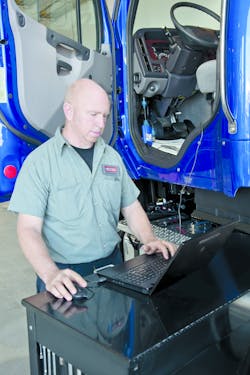When you purchase a vehicle, do you own all of it?
Here’s my question: When you buy a vehicle, do you own all of it?
Now before you advise me to immediately seek a check-up from the neck up, consider this: Vehicles nowadays are essentially computers on wheels, with computers controlling all types of components and systems.
When you buy a vehicle, you do own it, but not its data or the repair codes that give you, or an independent service provider, the ability to repair it.
OEMs protect their intellectual property and do not disclose their technical information, diagnostic tools and test equipment and training with the independent automotive aftermarket and independent service providers – or vehicle owners, for that matter.
OEMs say this preserves the vehicle’s operations and prevents warranty disputes. However, this basically gives OEMs a monopoly that locks the vehicle buyer to the OEM and its dealership network for service, maintenance and repair. Where to have this work done is not a matter of choice, and, if current laws are approved, will not be an option in the future because “individuals and independents” lack the ability to “talk” to vehicle computers.
It’s a profitable monopoly. Vehicle service, repair and parts makes up a significant portion of the revenue for OEM dealers.
While that may be, the OEMs say the vehicle “tie in” to their dealers is necessary. In general, they worry about the work quality of vehicle owners and independent repair shops that could result from improperly trained technicians and the substitution of original parts with inferior replacements. By “controlling” the data, diagnostic tools and parts, the OEMs say they are trying to protect themselves and their component/assembly warranties.
In the meantime, because of the common occurrence of work backlogs at truck dealerships – where much repair work must be done – excessive downtime becomes a costly issue – especially when it comes to heavy duty trucks.
MASSACHUSETTS’ R2R
In December 2013, Massachusetts became the first state in the country to adopt legislation governing access to vehicle diagnostic information. Its “right to repair” (R2R) law requires vehicle manufacturers to provide access to their diagnostic repair system through either a tool or a computer system contained in the vehicle.
The law applies only to vehicles under 10,000 lbs GVW.
Following this, the Right to Repair National Memorandum of Understanding (MOU) was drafted by these predominately automobile focused groups:
- Alliance of Automobile Manufacturers (www.autoalliance.org).
- Association of Global Automakers (www.globalautomakers.org).
- Auto Care Association (www.autocare.org); was formerly the Automotive Aftermarket Industry Association.
- Coalition for Auto Repair Equality (www.careauto.org).
This MOU is an agreement intended to have Massachusetts’ R2R law – which requires vehicle OEMs to make available to the independent vehicle repair industry on “fair and reasonable terms,” the same tools, software and repair information that they make available to their franchised dealers – be a national standard.
HEAVY DUTY TRUCKS, MOTOR COACHES AND BUSES
Last September, the following organizations signed a MOU on access to service information, tools and parts on Model Year 2010 and later trucks and buses over 10,000 lbs GVW by vehicle owners and independent repair facilities:
- Auto Care Association.
- Commercial Vehicle Solutions Network (www.cvsn.org).
- Equipment and Tool Institute (www.etools.org).
- Heavy Duty Aftermarket Canada (www.hddc.ca).
- Truck and Engine Manufacturers Association (www.truckandenginemanufacturers.org).
Under the terms of this MOU, these organizations will work together to monitor the exchange of service information, tools and parts needed for trucks and buses to be repaired outside the dealer network and address any information access issues with the goal of helping to ensure that these vehicle are properly and safely maintained.
KEY IMPACTS ON HEAVY DUTY VEHICLES
Of concern is that this MOU is based on the one for light duty vehicles and overlooks the distinctive characteristics of the heavy duty vehicles. The truck and bus MOU calls for use of certain computer interfaces that truck manufacturers don’t use, plus it requires information that is not available for heavy duty vehicles.
Furthermore, unlike light duty OEMs, heavy duty truck manufacturers are not totally integrated. Certain systems and components – such as transmissions and emission controls – may include proprietary information that is not owned by the truck manufacturer, and thus, truck OEMs don’t have access to all the information required to be available.
Adding to the problem is that heavy duty trucks are often individually spec’d. Consequently, the amount of information that is needed to comply with the truck and bus MOU initiative is considerable.
OVERSEAS
Interestingly, Europe has been more aggressive than the U.S. in right to repair. Several major car OEMs there have a legally binding commitment to provide technical information to independent repair shops in the European Union.
In announcing the agreement, the European Commission noted: “… if repairs were carried out (by independent shops or individuals) without the right technical information, this could lead to vehicles being driven in an unsafe condition, and add to air pollution and wasted fuel.”
How do you feel about right to repair, especially as it applies to commercial trucks and buses?
About the Author

